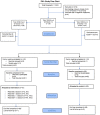Feasibility of Group Problem Management Plus (PM+) to improve mental health and functioning of adults in earthquake-affected communities in Nepal
- PMID: 32452336
- PMCID: PMC7264859
- DOI: 10.1017/S2045796020000414
Feasibility of Group Problem Management Plus (PM+) to improve mental health and functioning of adults in earthquake-affected communities in Nepal
Abstract
Aims: Psychological interventions that are brief, acceptable, effective and can be delivered by non-specialists are especially necessary in low- and middle-income countries, where mental health systems are unable to address the high level of psychosocial needs. Problem Management Plus (PM+) is a five-session intervention designed for those impaired by psychological distress while living in communities affected by adversity. Individual PM+ has demonstrated effectiveness in reducing distress in Kenya and Pakistan, and a group version of PM+ (Group PM+) was effective for conflict-affected women in Pakistan. This paper describes a feasibility and acceptability trial of locally adapted Group PM+ for women and men in an earthquake-affected region of rural Nepal.
Methods: In this feasibility cluster randomised controlled trial, participants in the experimental arm were offered five sessions of Group PM+ and participants in the control arm received enhanced usual care (EUC), which entailed brief psycho-education and providing referral options to primary care services with health workers trained in the mental health Gap Action Programme Intervention Guide (mhGAP-IG). A mixed-methods design was used to assess the feasibility and acceptability of Group PM+. Feasibility was assessed with criteria including fidelity and retention of participants. Acceptability was assessed through in-depth interviews with participants, family members, programme staff and other stakeholders. The primary clinical outcome was depression symptoms assessed using the Patient Health Questionnaire (PHQ-9) administered at baseline and 8-8.5 weeks post-baseline (i.e. after completion of Group PM+ or EUC).
Results: We recruited 121 participants (83% women and 17% men), with equal allocation to the Group PM+ and EUC arms (1:1). Group PM+ was delivered over five 2.5-3 hour sessions by trained and supervised gender-matched local non-specialists, with an average attendance of four out of five sessions. The quantitative and qualitative results demonstrated feasibility and acceptability for non-specialists to deliver Group PM+. Though the study was not powered to assess for effectiveness, for all five key outcome measures, including the primary clinical outcome, the estimated mean improvement was larger in the Group PM+ arm than the EUC arm.
Conclusion: The intervention and trial procedures were acceptable to participants, family members, and programme staff. The communities and participants found the intervention to be beneficial. Because feasibility and acceptability were established in this trial, a fully powered randomised controlled trial will be conducted for larger scale implementation to determine the effectiveness of the intervention in Nepal.
Keywords: Group therapy; mental health; other psychosocial techniques/treatments; randomised controlled trials.
Conflict of interest statement
None.
References
-
- Ashworth M, Shepherd M, Christey J, Matthews V, Wright K, Parmentier H, Robinson S and Godfrey E (2004) A client-generated psychometric instrument: the development of ‘PSYCHLOPS’. Counselling and Psychotherapy Research 4, 27–31.
-
- Bryant RA, Schafer A, Dawson KS, Anjuri D, Mulili C, Ndogoni L, Koyiet P, Sijbrandij M, Ulate J, Harper Shehadeh M, Hadzi-Pavlovic D and van Ommeren M (2017) Effectiveness of a brief behavioural intervention on psychological distress among women with a history of gender-based violence in urban Kenya: a randomised clinical trial. PLoS Medicine 14, 1–20. - PMC - PubMed
-
- Clarke K, Azad K, Kuddus A, Shaha S, Nahar T, Aumon BH, Hossen MM, Beard J, Costello A, Houweling TA, Prost A and Fottrell E (2014a) Impact of a participatory intervention with women's groups on psychological distress among mothers in rural Bangladesh: secondary analysis of a cluster-randomised controlled trial. PLoS ONE 9, 1–8. - PMC - PubMed
-
- Clarke K, Saville N, Bhandari B, Giri K, Ghising M, Jha M, Jha S, Magar J, Roy R, Shrestha B, Thakur B, Tiwari R, Costello A, Manandhar D, King M, Osrin D and Prost A (2014b) Understanding psychological distress among mothers in rural Nepal: a qualitative grounded theory exploration. BMC Psychiatry 14, 60. - PMC - PubMed
Publication types
MeSH terms
LinkOut - more resources
Full Text Sources
Medical
Miscellaneous


